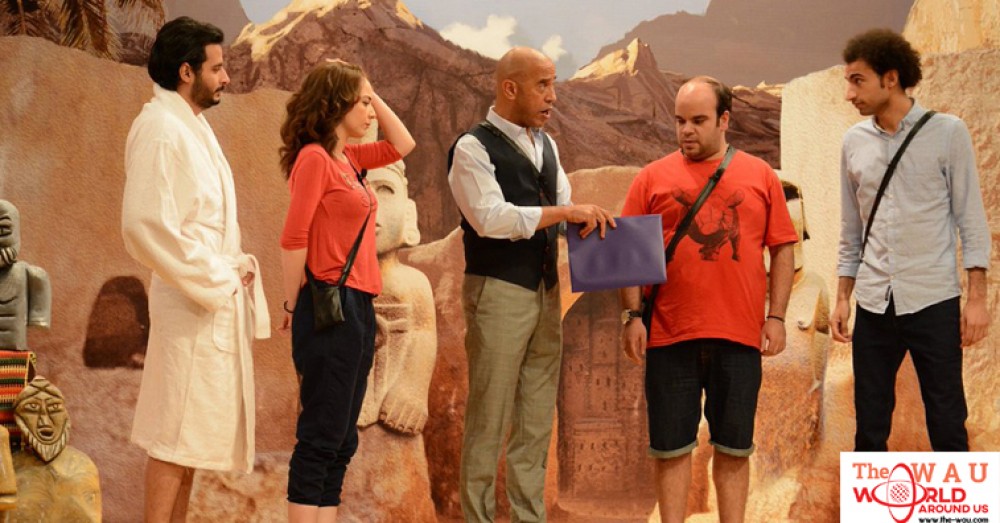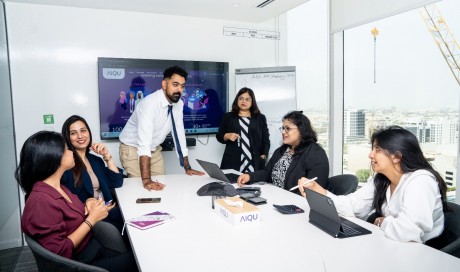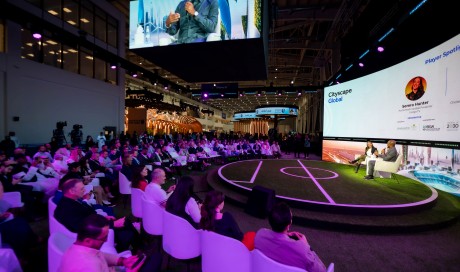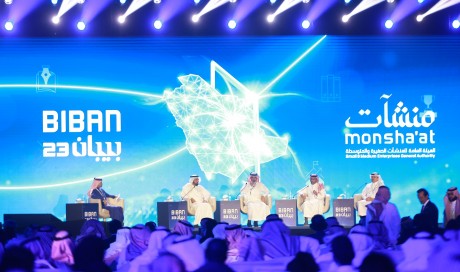Saudi Arabia has sought the help of Egyptian artist Ashraf Abdel Baqi to establish a mixed-gender Saudi theater troupe in the framework of the kingdom's social policy of becoming less stringent.
Saudi Arabia recently opened its first cinema, is going to allow women to drive and held the first cycling competition in which women participated. To develop its performing arts sector, the kingdom invited Abdel Baqi, the founder of Masrah Masr theater troupe, to work in the country. Performances by Masrah Masr (Egypt Theater) were broadcast on the Saudi MBC TV network.
Abdel Baqi’s efforts to build the Masrah al-Saudia (Saudi Theater) yielded their first results when a cast of 50 Saudi men and women put on two plays in early April. “Dunya al-Alaab” ("Toy World") and “Mamnou Doukhoul al-Sayidat” ("Entry of Women Prohibited") were performed on the stage of the Society of Culture and Arts in Jeddah.
The director of Gulf productions for the MBC Group, Ahmed al-Assaf, who oversees the work of the Saudi troupe, said during a press conference April 5, “The Saudi Theater is echoing the experience of Masrah Masr and aims to train young talents, and to turn some of them into theater and television stars.”
Assaf added, “Masrah Masr has given many young actors a platform to shine and they have become famous in Egyptian series. This is the aim of the Saudi Theater, too.”
Abdel Baqi told the local press during a news conference April 17 that he chose 50 men and women from the 800 who auditioned over a three-week period; it took another three weeks to train them.
He said the selected plays do not offend local sensitivities. “Conservative voices in Saudi Arabia expressed their gratitude after watching the shows because I was careful to observe the traditions of the kingdom. … The shows received wide public turnout. The first two shows were sold out and tickets were booked for two full weeks,” he said.
Abdel Baqi added, “I handle the responsibility of directing the theater shows, and I signed contracts for 20 plays that will be shown on the MBC TV channel.”
Collaboration with the Saudi Theater was challenging, Abdel Baqi said. “The accent was the biggest challenge for me. The Saudis do not have a unified accent; Jeddah’s residents do not speak like other citizens. I had to be careful because it is a sensitive issue, and it took me a while to learn the nuances of each accent,” he said.
In regard to actors and actresses working together for the first time in a theater troupe in Saudi Arabia, Abdel Baqi told the Saudi Al-Arabiya channel March 30, “For the first time men and women took part together in theater performances. I guided them in a way that respected traditions in the kingdom, and I realized how talented they were and respectful of social customs.”
He added, “I was surprised to see these amazing talents and love for acting among the young people. We managed to perform the first two plays that both carry a social message and comic scenes that are appropriate for Saudi society."
Egyptian art critic Tareq al-Shennawi told Al-Monitor, “Egypt will play a part in the artistic activity in Saudi Arabia, as it is the country benefiting the most from Saudi social and artistic activity, just as it had been harmed by the kingdom’s regression and oppression.”
He said, “Egyptian art fits into Saudi society. For this reason, Egyptian singers such as Tamer Hosny and Mohamed Hamaqi performed as part of the first Saudi concert [in March]. Saudi Arabia resorted to Abdel Baqi for theater as he has experience in the field.”
Shennawi also said, “The Saudi Theater will succeed if it meets the standards that conform to Saudi Arabia's societal norms. The Saudi Theater will play an important role in reviving theater in the kingdom.”
He added, “In the next stage, Egypt and Saudi Arabia will promote their artistic cooperation in the fields of cinema and theater. Egyptian and Saudi production companies will coordinate to produce Saudi films with the participation of Egyptian actors. In Saudi Arabia, Egypt is called 'the Arab Hollywood.' Therefore Egypt must be part of the arts movement in Saudi Arabia.”
Saudi writer and director Yasser Madkhali, who is responsible for the content of the Saudi Theater initiative, was quoted by the Saudi newspaper Al Yaum as saying, “Establishing the Saudi Theater emulates the Masrah Masr experience, but in a way that suits the spectator in the kingdom and the Arab world, while ensuring the construction of the Saudi identity.”
He added, “We want theater to become part of family entertainment. The Saudi initiative will contribute to creating a market for theater and will motivate creative people to show their plays for a longer time.”
Share This Post















